
Understanding the Tapestry of Trauma Responses: A Deeper Dive
Trauma isn’t just about what happened—it’s about how your nervous system responded to a rupture in safety, trust, or connection. Many behaviors that seem confusing, frustrating, or even self-sabotaging are actually profound adaptations to distress. From emotional numbing to hypervigilance, people-pleasing to risk-taking, this article explores the nuanced spectrum of trauma responses and offers a compassionate reframing of these patterns. When we understand them as survival strategies—not flaws—we open the door to healing, self-trust, and deeper connection.

The Hidden Impact of Unresolved Trauma on Relationships
Unresolved trauma often lingers beneath the surface, shaping how we connect with others in ways we may not realize. From trust issues to emotional triggers, its effects on relationships can be profound. Explore how trauma manifests in our interactions and learn actionable steps to heal and rebuild stronger, healthier connections.

The CDC-Kaiser Permanente Adverse Childhood Experiences (ACE) Study: Unraveling the Personal Impact on Adult Lives
The Adverse Childhood Experiences (ACE) Study, conducted by the CDC and Kaiser Permanente, has revolutionized how we understand the lifelong effects of childhood trauma. This landmark research shows how early adversities—like abuse and neglect—can lead to chronic health conditions, mental health struggles, and social challenges in adulthood. Dive into the study’s findings, the far-reaching impact of ACEs, and how trauma-informed care and early intervention are critical for breaking the cycle of trauma across generations.

“Daddy Issues" and Misplaced Responsibility
In our latest Pathways to Wellness blog post, Francesca Wehr, LCSW, delves into the complex dynamics of 'Daddy Issues' and misplaced responsibility. Discover how childhood experiences can shape adult relationships and learn effective strategies for healing and personal growth. Join us as we explore the impact of early parental relationships on mental health and provide actionable insights for a healthier, more fulfilling life.

How Trauma Impacts the Body: An In-Depth Exploration of Mind-Body Healing
Trauma affects more than just the mind—it leaves a lasting imprint on the body. Dr. Bessel van der Kolk’s concept, “The Body Keeps the Score,” reveals how trauma is stored within our physiology, often manifesting as chronic pain, fatigue, and other health issues. By exploring the powerful connection between mind and body, and through integrative approaches like somatic therapy, individuals can begin to heal from trauma in a truly holistic way. Discover how addressing both mental and physical aspects of trauma can lead to lasting wellness and resilience.

Healing from Emotional Abuse and the Maze of Reenactment
Join Francesca Wehr, LCSW, as she guides us through the complex journey of healing from emotional abuse. This insightful post delves into the phenomena of trauma reenactment and revictimization, shedding light on the subconscious patterns that perpetuate past traumas into present scenarios. Learn about the psychological underpinnings of trauma, effective coping mechanisms, and therapeutic strategies that aim to break the cycle of abuse and empower individuals towards a resilient and renewed self.

From Survival to Healing: Navigating Post-Traumatic Stress and Finding Resolution
The last part of the “From Surviving to Healing” Trauma series, this blog post navigates the complex journey from survival to healing. This requires more than just revisiting traumatic memories; it demands a reconnection to the present and a reclamation of one's sense of safety and self. For many trauma survivors, the past feels unsettlingly close, a series of vivid flashbacks and heightened states that blur the lines between then and now. The challenge is not merely to recount the trauma but to feel, deep in one's bones, that it has passed and that safety has been restored.
Healing involves a delicate balance of acknowledging the trauma while firmly rooting oneself in the present, employing strategies to calm the nervous system, and recognizing triggers without being overwhelmed by them. Techniques like mindfulness, somatic therapies, and EMDR offer pathways to process traumatic memories in a way that diminishes their power, allowing survivors to redefine their narratives on their own terms. This transformative process paves the way for a life where trauma informs but does not control, where past pain leads to present resilience, and where each survivor can truly say, "I am here, I am safe, and I am moving forward."

From Survival to Healing: Understanding Trauma-Related Fragmentation and Dissociation
FROM SURVIVING TO HEALING: In the intricate landscape of trauma recovery, the phenomena of fragmentation and dissociation stand out as critical survival mechanisms employed by individuals facing overwhelming threats, particularly in childhood. These adaptive responses, deeply rooted in our biological and psychological makeup, serve to protect the psyche by compartmentalizing traumatic experiences, allowing for survival amidst adversity. However, these same mechanisms that once ensured survival can later obstruct the path to holistic healing, creating a complex interplay of internal parts that may feel disconnected or at odds with one another. Understanding these facets of the trauma response is pivotal in the journey from merely surviving to truly healing, offering a beacon of hope for those navigating the challenging path to integration and wholeness.

From Survival to Healing: Insights into Our Brain and Body's Response
This blog post takes you on a personal journey through the landscape of trauma, focusing on the deep-seated responses our bodies and minds have to traumatic events. It sheds light on the limbic system—the emotional heart of our brain—and how it's hardwired to protect us, often leaving us with trauma that feels ever-present. We explore the idea of 'triggers,' those unexpected moments that suddenly transport us back to our traumatic experiences, and why they can be so powerful.
But this isn't just a scientific exploration; it's an invitation to see your own trauma responses in a new light. We delve into the idea that the ways we've reacted to trauma—perhaps with anxiety, avoidance, or hyper-alertness—aren't signs of weakness but are actually testament to our incredible ability to survive. Through personal reflection, the post encourages you to consider how these responses have served you, offering a compassionate perspective on your journey toward healing.
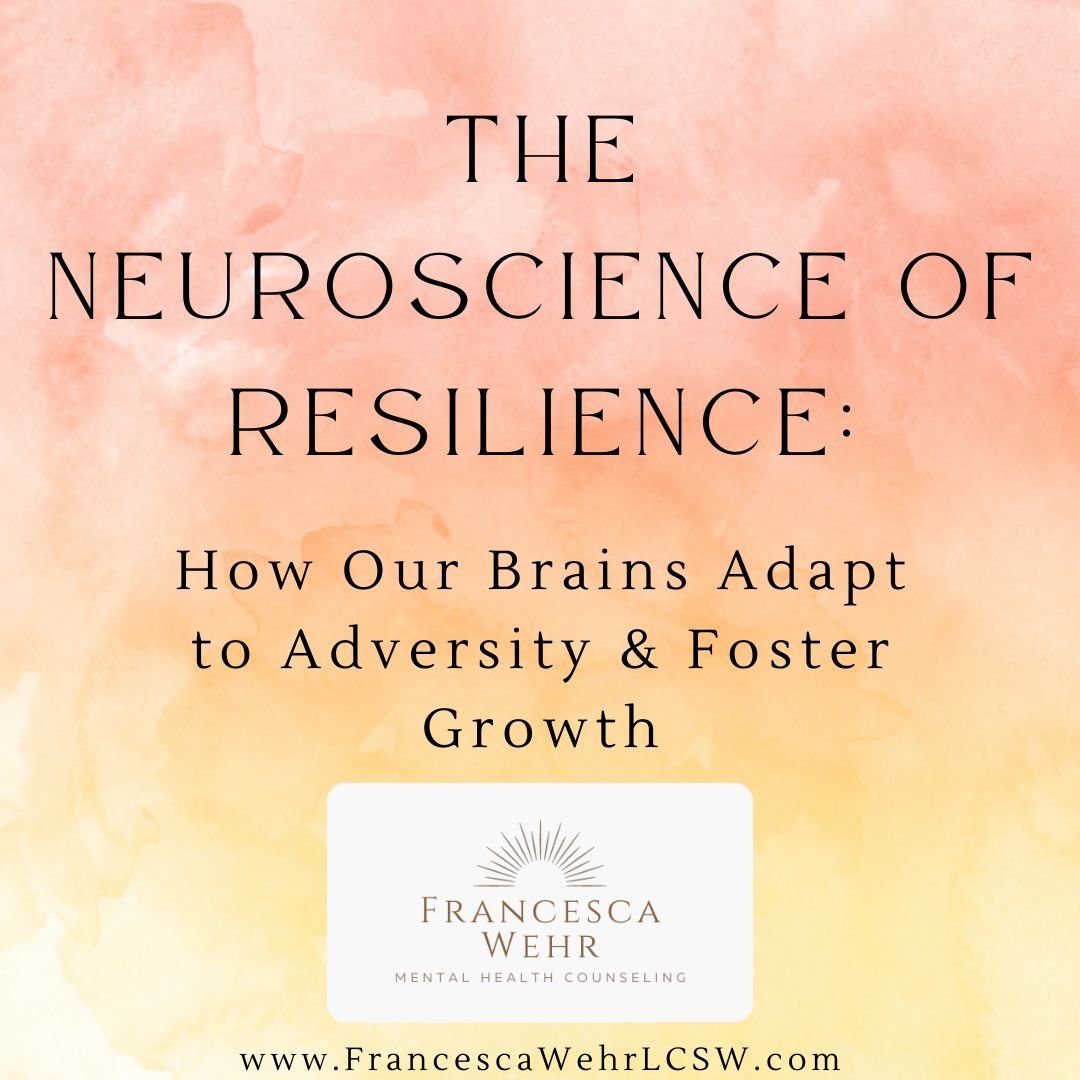
The Neuroscience of Resilience: How Our Brains Adapt to Adversity and Foster Growth
Resilience is the ability to bounce back from adversity, cope with challenges, and adapt to change. The science behind resilience reveals how our brains respond to and learn from difficult experiences, allowing us to grow and thrive. Pathways to Wellness: Insights from Francesca Wehr, LCSW Mental Health Counseling delves into the neuroscience of resilience, explores how our brains adapt to adversity, and shares research-backed strategies for building resilience and fostering personal growth.
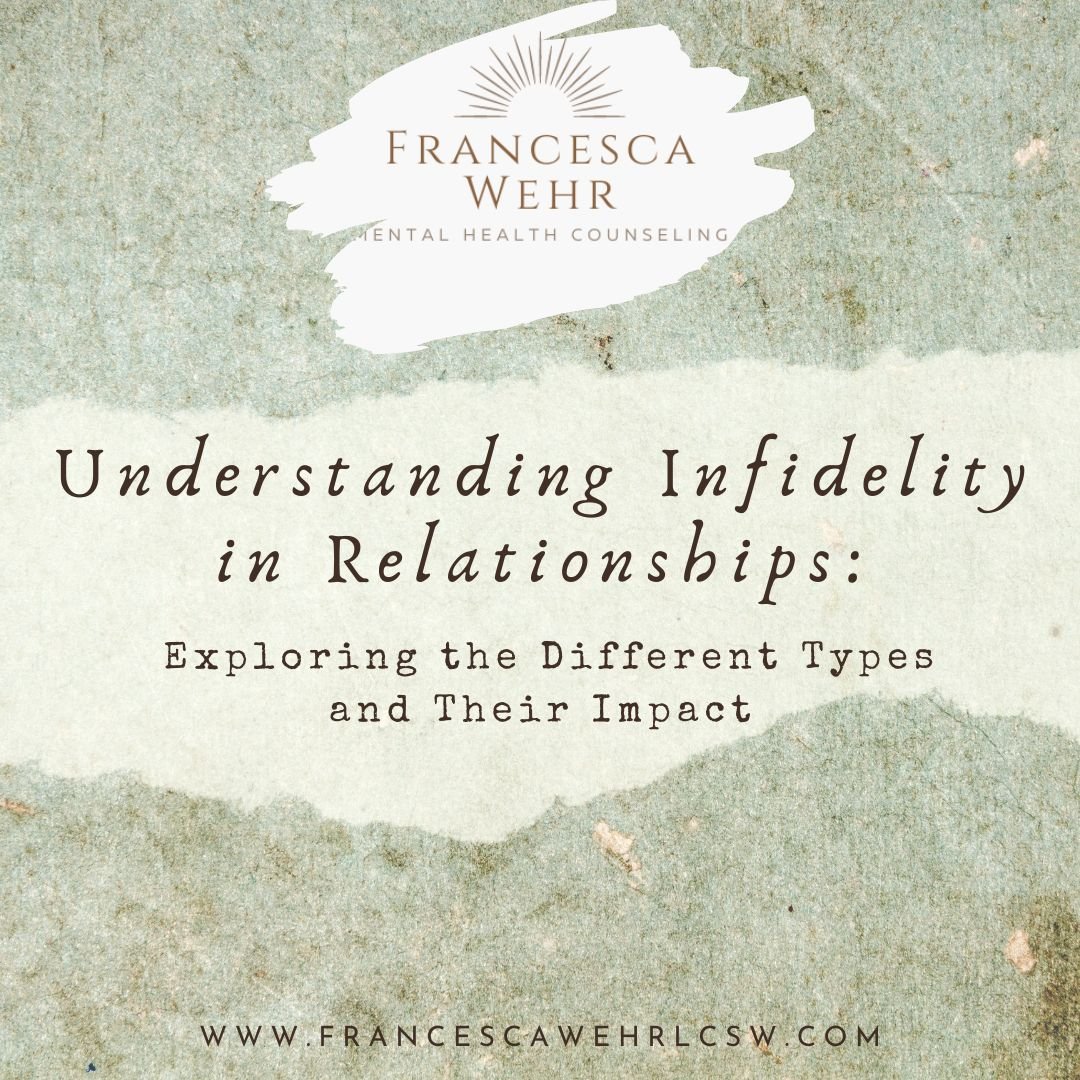
Understanding Infidelity in Relationships: Exploring the Different Types and Their Impact
Infidelity, or the act of being unfaithful in a committed relationship, is a complex and emotionally charged issue. It can manifest in various forms, each with its unique challenges and consequences. Pathways to Wellness: Insights from Francesca Wehr, LCSW Mental Health Counseling explores the different types of infidelity – physical, emotional, cyber, object, and financial – and provides examples of each to help deepen our understanding of this sensitive topic.
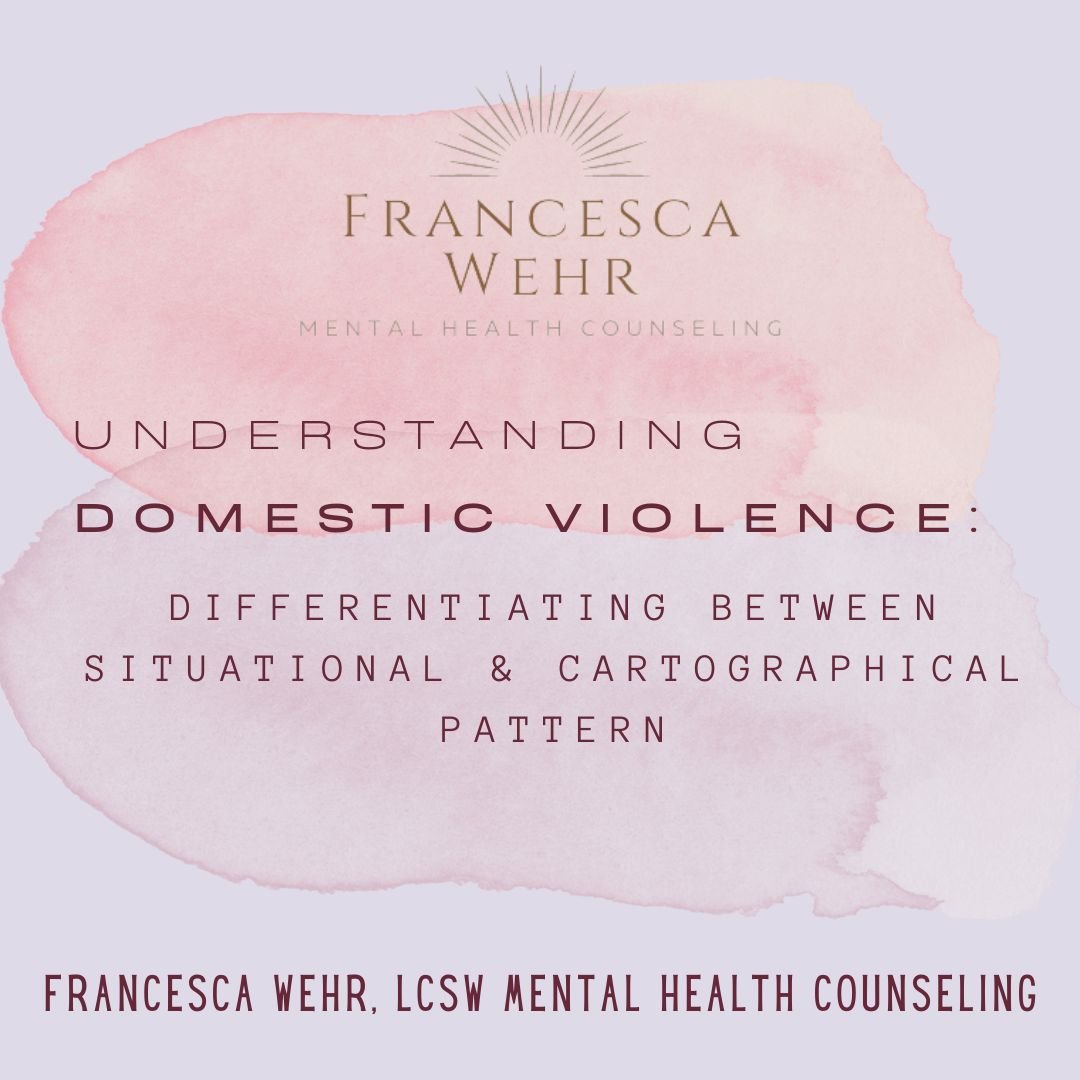
Understanding Domestic Violence: Differentiating Between Situational and Cartographical Pattern
Domestic violence is a complex and pervasive issue that affects millions of people worldwide. It can manifest in various forms and patterns, making it essential to understand its nuances to effectively address and prevent it. Francesca Wehr, LCSW Mental Health Counseling discusses two primary types of domestic violence: situational and cartographical. By recognizing these patterns and understanding their differences, we can better support victims and work towards a safer, more compassionate society.
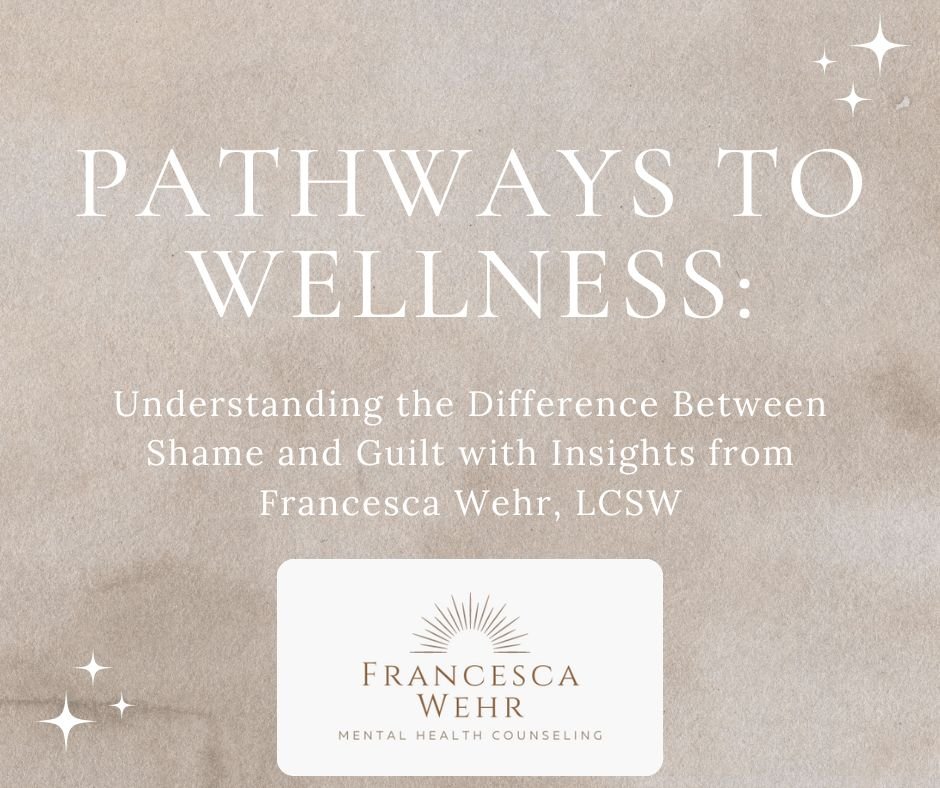
Pathways to Wellness: Understanding the Difference Between Shame and Guilt with Insights from Francesca Wehr, LCSW
The emotions of shame and guilt, although closely related, have distinct characteristics and effects on our mental health and behavior. In this blog post, we will delve into the insights of Francesca Wehr, LCSW, to understand the difference between shame and guilt, and how they impact our ability to own up to our mistakes and grow as individuals.

Trauma Unraveled: Understanding the Individual Nature of Traumatic Experiences
Pathways to Wellness: Insights from Francesca Wehr, LCSW Mental Health Counseling delves into the intricate subject of trauma, exploring its multifaceted nature and how it affects individuals differently. By gaining a deeper understanding of trauma, we can begin the journey towards healing and recovery.

Abusive Relationships, Gaslighting, and the Cycle of Violence: Warning Signs and Pathways to Wellness
Pathways to Wellness: Insights from Francesca Wehr, LCSW Mental Health Counseling discusses the red flags and warning signs of toxic and abusive relationships, the cycle of violence, how to leave abusive relationships safely, and the resources available for those affected by domestic abuse. Recognizing and addressing these issues can empower individuals to seek help and break free from unhealthy relationships.
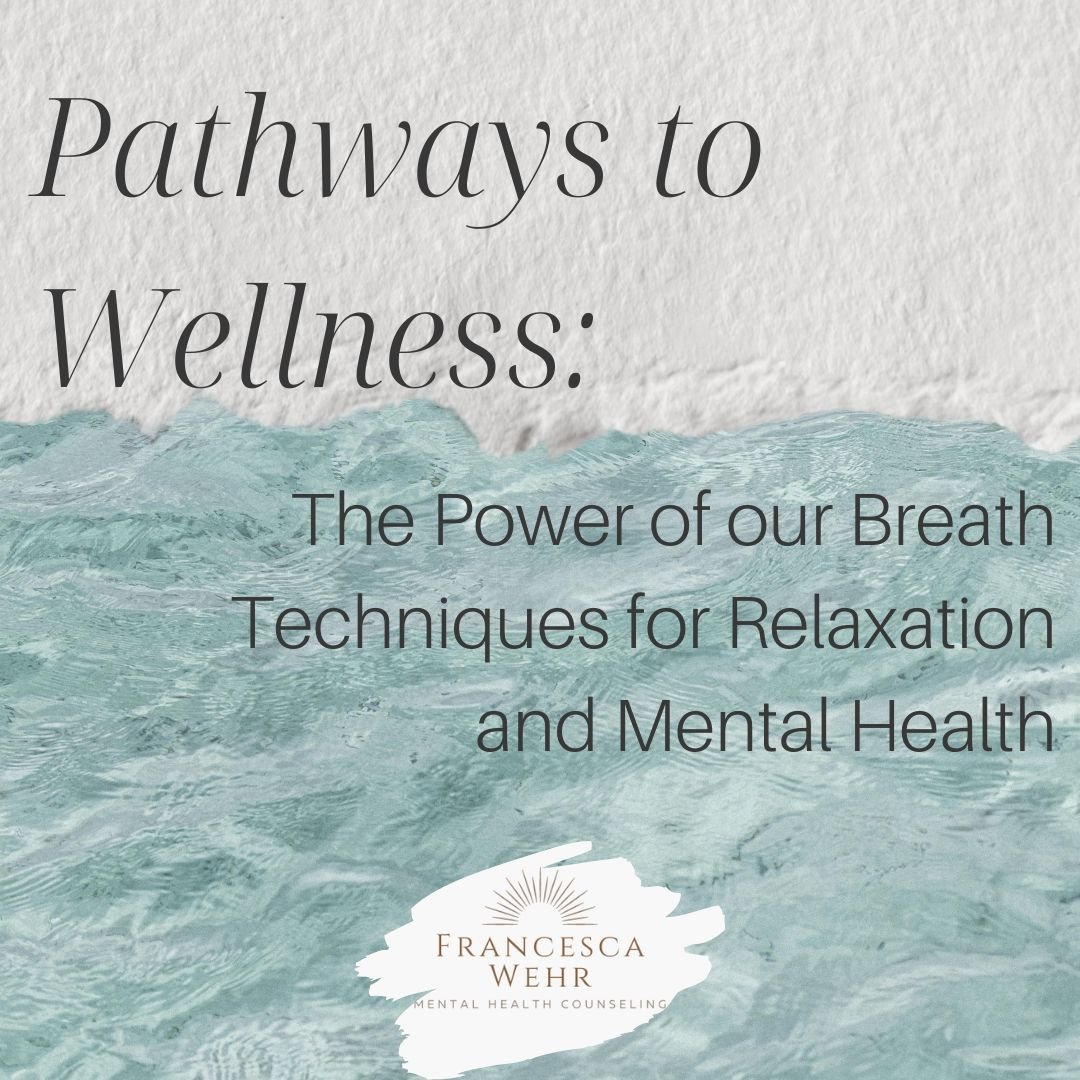
Pathways to Wellness: The Power of our Breath Techniques for Relaxation and Mental Health
Breathing exercises, such as diaphragmatic breathing and the 4-7-8 technique, have long been recognized as powerful tools for promoting relaxation and improving mental health. These techniques elicit a relaxation response, which can help to counteract the effects of stress and anxiety on the nervous system. Francesca Wehr, LCSW Mental Health Counseling explores the physical response to these exercises and the impact they have on the nervous system to improve mental health and relaxation.

Emotional Immaturity: Signs, Consequences, and the Impact on Children
Emotional immaturity can manifest in various ways, including defensiveness, taking things personally, black-and-white thinking, and being dismissive of others' feelings. When emotional immaturity is present in parents, it can have lasting effects on their children. Francesca Wehr, LCSW Mental Health Counseling explores the signs of emotional immaturity, the consequences of these behaviors, and the impact emotionally immature parents can have on their children.

Complex PTSD and Childhood Chronic Stress: Understanding the Impact and Path to Healing
Pathways to Wellness: Insights from Francesca Wehr, LCSW Mental Health Counseling explores the complex relationship between chronic stress during childhood, Complex Post-Traumatic Stress Disorder (C-PTSD), and the effects on mental health. We will also discuss the process of healing and recovery for those affected by these challenging experiences. By gaining a better understanding of C-PTSD and its roots in early life stress, we can help promote healing, resilience, and well-being.




